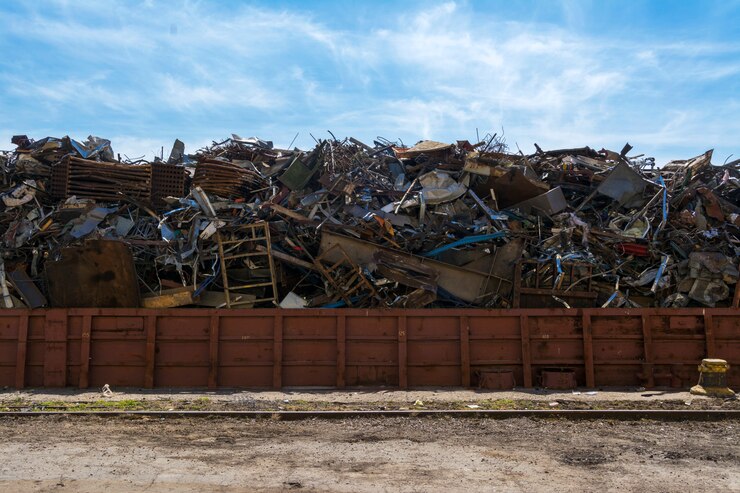Scrap metal recycling plays a vital role in the UAE’s sustainability goals. With growing industries and infrastructure, the country produces a significant amount of metal waste. Scrap metal companies in uae help manage this waste through efficient recycling methods. This guide explores the key processes involved in metal recycling, the types of metals collected, and how these practices benefit the environment and economy.
Understanding Scrap Metal Recycling
What Is Scrap Metal?
Scrap metal refers to metal parts or products that are no longer in use but can be recycled. These include items like used car parts, old appliances, construction materials, and manufacturing leftovers.
Why Recycle Scrap Metal?
Recycling reduces the need for mining. It saves energy and limits pollution. It also turns waste into reusable raw material for manufacturing. This helps conserve natural resources and supports a circular economy.
Types of Scrap Metal Collected in the UAE
Ferrous Metals
Ferrous metals contain iron. Common examples are steel and cast iron. These are widely used in construction, machinery, and transportation. Recycling them involves separation using magnets and reprocessing in furnaces.
Non-Ferrous Metals
Non-ferrous metals include aluminum, copper, brass, zinc, and lead. They do not contain iron and are resistant to rust. These metals are often found in electrical wiring, pipes, and electronics. They are valuable and easy to recycle.
Precious and Specialty Metals
Metals like gold, silver, and titanium fall under this category. Though less common in scrap yards, these are recovered from electronics and high-end machinery.
Collection and Sorting
Collection Channels
Scrap metal companies in the UAE collect metal from multiple sources. These include manufacturing units, demolition sites, car repair shops, and individual sellers. Some companies also offer doorstep pickup services for bulk quantities.
Sorting Process
Sorting is crucial to ensure purity. Workers or machines separate metals by type and grade. Ferrous metals are separated using magnets. Non-ferrous metals are sorted based on weight, color, and conductivity. Some facilities use advanced sensors or AI technology for better accuracy.
Processing and Shredding
Cleaning and Stripping
Before recycling, metal scrap is cleaned. This step removes paint, plastic, rubber, or any non-metal elements. For example, copper wires are stripped of insulation.
Shredding and Crushing
Once cleaned, the scrap is shredded into smaller pieces. Shredding increases surface area and makes melting more efficient. For example, aluminum cans are crushed and baled before entering the furnace.
Melting and Refining
Melting the Scrap
The shredded metal is placed in large industrial furnaces. Each type of metal has its specific melting point. The process is energy-intensive but still uses less energy than producing new metal from ore.
Removing Impurities
During melting, impurities float to the top and are removed. This refining process ensures the final product is high-quality and suitable for reuse in various industries.
Solidifying and Transporting
Cooling and Solidification
Once purified, the molten metal is poured into molds. It solidifies into bars, rods, or sheets. These are called ingots or billets, depending on the shape and size.
Distribution to Industries
The solidified metal is then sold to manufacturers. It can be used to make car parts, construction materials, packaging, and electronics.
Environmental and Economic Benefits
Energy Savings and Emission Reduction
Recycling metals uses less energy than mining and processing virgin ores. For example, recycling aluminum saves up to 95% of the energy needed to create new aluminum. It also reduces greenhouse gas emissions.
Job Creation and Resource Efficiency
The scrap metal recycling industry creates jobs in collection, sorting, and processing. It also reduces landfill use and promotes resource efficiency. These practices align with the UAE’s green economy and waste reduction goals.
Regulations and Industry Standards in the UAE
Licensing and Compliance
Scrap metal companies in the UAE must operate under licenses issued by local authorities. These include the Dubai Municipality, Abu Dhabi Environment Agency, and other regulatory bodies. They ensure companies follow environmental and safety standards.
Import and Export Rules
The UAE allows both local recycling and export of scrap metal. Exporters must comply with customs regulations and quality standards. Proper documentation and handling are required to prevent illegal dumping or mislabeling.
Role of Technology in Recycling
Automation and AI
Modern facilities in the UAE use automated machines and AI to sort and process metals efficiently. This reduces human error and speeds up operations.
Data and Tracking
Digital platforms help track collection, weight, and type of scrap metal. This improves transparency and helps manage supply chains better.
Conclusion
Scrap metal recycling in the UAE is a well-structured process involving collection, sorting, shredding, melting, and reuse. It supports sustainability, reduces waste, and strengthens the circular economy. Scrap metal companies play a key role in turning discarded materials into valuable resources. Understanding how this process works helps individuals and businesses contribute to a greener future.
